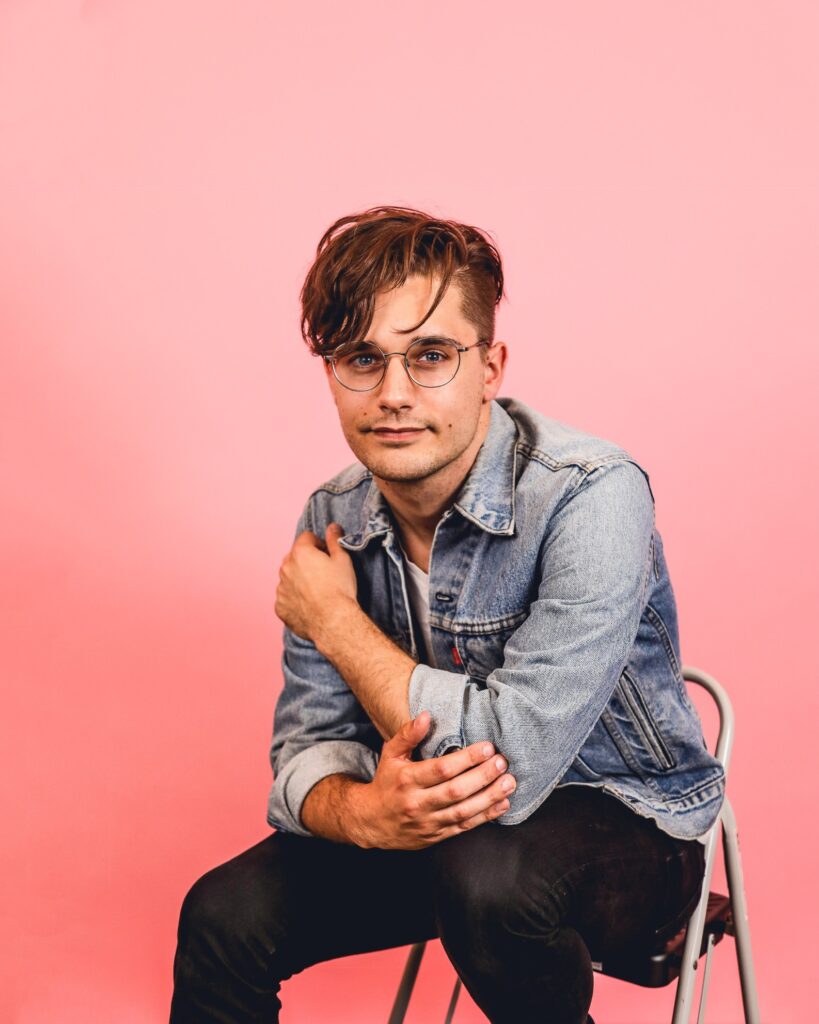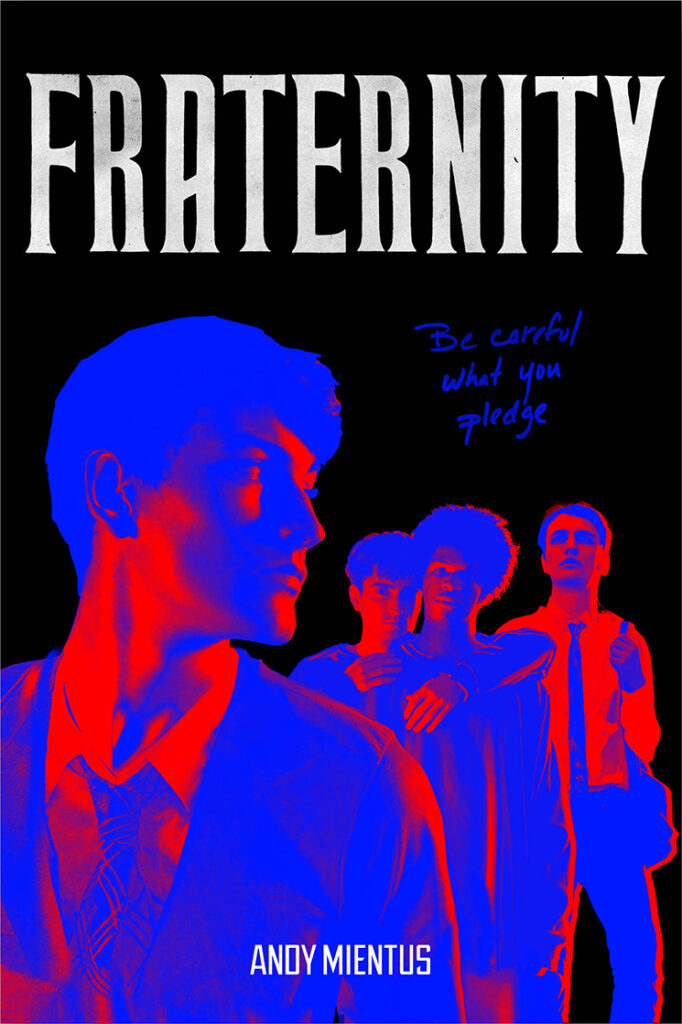Fraternity provides a fresh take on the queer coming of age story
Despite all societal gains for our community, it could never be said that being a queer kid is easy. Being a kid and going through puberty is hard enough but layer on any sort of LGBTQ+ identification and it all becomes exponentially more complicated.
One of the things that eases that burden is representation. Seeing yourself in the media you consume is vital to realizing that you are normal and there are others like you out there. Fraternity, the debut young adult novel from openly queer actor of stage and screen Andy Mientus (Spring Awakening, Smash) seeks to provide that representation for today’s gay youth:

In the fall of 1991, Zooey Orson transfers to the Blackfriars School for Boys hoping for a fresh start following a scandal at his last school. However, he quickly learns that he isn’t the only student keeping a secret. Before he knows it, he’s fallen in with a group of boys who all share the same secret, one which they can only express openly within the safety of the clandestine gatherings of the Vicious Circle––the covert club for gay students going back decades. But when the boys unwittingly happen upon the headmaster’s copy of an arcane occult text, they unleash an eldritch secret so terrible, it threatens to consume them all.
A queer paranormal story set during the still-raging AIDS crisis; Fraternity examines a time not so long ago when a secret brotherhood lurked in the shadows. What would Zooey and his friends do to protect their found family??? You’ll have to read it to find out!
The book is already getting high praise from the likes of out comedian Bowen Yang who described it as: “The queer found family scary sexy emotional grunge coming-of-age story I never knew I needed growing up. If that sounds chaotic, welcome to queer youth. Fraternity captures the turmoil and joy of the time when queer young people first learn how much power they have when they come together.”
Gay author Arvin Ahmadi (Down and Across, Girl Gone Viral) said: “Brilliant, twisty, and oh-so-queer, Fraternity is the boarding school story of your witchy dreams. Andy Mientus has written a novel so fresh and immersive, one has to wonder if any magic spells were involved in the writing of this book.”
With reviews like these we had to learn more, so we sat down with the Andy Mientus to get the scoop!
Queer Forty: What made you want to tell this particular kind of story at this particular time?
Andy Mientus: This is a story that I’ve been kicking around in my head for a couple of years now, not really knowing exactly what to do with it or what form it would take. When I was growing up, I went to a regular public school, but for one summer I was sent to a boarding school; an Arts boarding school, that was a summer program at a college.
So, for the first time, I was away from home and in a dorm and experiencing that culture. I was around a lot of young queer kids and people. I was still years away from having my own awakening and self-actualization, but those experiences and moments showed me there was a different way to be ‘one of the boys’. There was a different kind of masculinity and a different community that I could be a part of; because up until that point, I had really spent my boyhood trying to be a square peg in a round hole. I was trying to be like the other guys in this public school that I went to, and not succeeding. Trying to change my voice and trying to change my body language and just really feeling out of place, but not even quite knowing why.
I wanted to look back at that time in my life and sort of tell a version of my queer boyhood and my experience of that, the shame that came with that, the confusion that came with that. But I also wanted to put it in a frame where I was able to tell some queer history that I wish I’d known, and give some additional lessons in survival that I wish I’d had to a young audience.
Queer Forty: Yes, Fraternity takes place in the midst of the AIDS crisis. How does that bit of queer history fit into the story?
Andy Mientus: Without giving too much away, the crisis is far away from our protagonist at the beginning of the story. These are boys who go to this very elite, very secluded, school in northern MA. This is a very privileged group of kids and so, the crisis is something that they might have heard about and might be aware of through the media. It’s now 1991, we’re saying AIDS, we know what it is, and we are learning more about where it comes from; but we don’t have the AIDS cocktail yet, it is still a death sentence.
And then over the course of the story it becomes much closer and so, as these boys are realizing what it means to be queer people, they realize that AIDS is very much a part of that–There are the joys and the secret codes and the culture of queerness, all the fun stuff; but then there’s also this other thing that they awaken to in a real way, and deal with together.
So much of my queer experience has been that duality, the joy of being a part of this community, but also some of the hard realities that come with it– and going through it all with your pack.

Queer Forty: Was there any kind of queer literature that you were exposed to when you were younger and how did it benefit you?
Andy Mientus: Not anything that comes to mind that was overtly queer and overtly for YA readers. I mean, I remember reading A Separate Peace and thinking like somethings up here, you know, but that was very veiled and coded.
Growing up I was getting theater training and being exposed to a lot of plays. I feel like that was where I sort of got my first eye into the queer world via, written words. It was through plays like Angels in America, or musicals like La Cage aux Folles.
And I had so many queer teachers, getting an arts education, getting a theatre education. So that was really my way in.
Queer Forty: Your book explores themes of horror and the occult. Are you a fan of the genre? And why do you think so many of us queer people are drawn to it?
Andy Mientus: I’m huge fan of horror and the occult. I think you’re absolutely right to clock that queer people in general seem to be drawn to the occult, and I think there could be for a few reasons for that.
The archetype of the witch is so useful, right, because she is rejecting the norm. She is pushing back against the church, the patriarchy. She’s generating power for herself and, coming together with other people who have the same secret, and claiming power together. I think this is a really potent symbol for what happens with queer people when they find each other. And also the clothes are good!!
And as for horror, one of my favorite books and movies is Stephen King’s Carrie because I like the way he writes her powers and the way they’re tied to her changing body. Her adolescence is so visceral, and feels so relatable.
I think I was drawn to including the occult in this story because of its usefulness as a queer symbol, but also its usefulness in a coming-of-age story of any kind.
Queer Forty: What are some of the other overarching themes, and what is it that you want readers to take away from your story?
Andy Mientus: I think readers are going to be surprised that it’s not really a love story. I think a lot of the queer lit that’s out there for young readers are these first love stories, which are great, and we need them; but I think friendship is also really universal, and I haven’t seen many queer books that focus more on community.
The takeaway will hopefully be that this group of characters will remind readers of their own core group of people, or if not, will encourage them to seek those folks out.
Queer Forty: A fantastic message. Found family is so very important in our community. Thanks so much for taking the time to chat with us Andy! Best of luck with the book launch.
Get your copy of Fraternity here or wherever books are sold.






